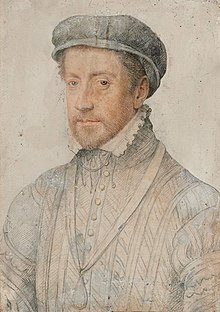| Louis de Bourbon | |
|---|---|
| Duke of Montpensier | |
 | |
| Born | 10 June 1513 Moulins |
| Died | 23 September 1582 Champigny |
| Spouse | Jacqueline de Longwy Catherine de Lorraine |
| Issue | Françoise, Duchess of Bouillon Anne, Duchess of Nevers François, Duke of Montpensier Charlotte, Princess of Orange |
| Father | Louis, Prince of La Roche-sur-Yon |
| Mother | Louise de Bourbon |
| Religion | Catholic |
Louis de Bourbon, Duc de Montpensier (10 June 1513 – 23 September 1582)[1] was the second Duke of Montpensier, a French Prince of the Blood, military commander and governor. He began his military career during the Italian Wars, and in 1557 was captured after the disastrous battle of Saint-Quentin. His liberty restored he found himself courted by the new regime as it sought to steady itself and isolate its opponents in the wake of the Conspiracy of Amboise. At this time Montpensier supported liberalising religious reform, as typified by the Edict of Amboise he was present for the creation of.
The Guise administration granted him a large super-governorship centred on the Duchy of Anjou in 1560, a territory he would govern for the next five years before handing it over to his son in 1565. By 1561 he was becoming increasingly alienated from the crown's religious policy and moved into opposition with Anne de Montmorency and François, Duke of Guise. As France fell into the French Wars of Religion the following year he fought for the crown, heading out at the head of a flying column after the security of Paris was assured, brutally massacring the Protestants of Angers after having subdued the town. In the peace that followed he allied himself with the Guise in their vendetta with the Montmorency, supporting them through both legal and extra-legal means. In 1565 his brother died, and he become governor of Dauphiné, relinquishing this governorship too in 1567 to his son. During the second civil war he again fought for the crown, besting Protestants that sought to join the main force besieging Paris. On the death of Montmorency he guided the young Anjou in his leadership of the army. In the third civil war he again defeated a Protestant army of the south trying to link up with the main body. He also committed another massacre at Mussidan. When Martigues died during the siege of Saint-Jean-d'Angély, Montpensier took up his governorship of Brittany.
In 1572 he supported the Massacre of Saint Bartholomew, unsuccessfully trying to incubate it in Nantes while succeeding in Saumur and Angers. During the fifth civil war he fought in the west, reducing the towns of Lusignan and Fontenay before being recalled to Paris. With a favourable peace declared for the Protestants Ligues rose up in opposition to it, with the support of the Guise. Montpensier had by now tired of the militant Catholicism he had held for the past decades, and through his support behind toleration and peace, arguing unsuccessfully that it was the only policy that would save France in front of the Estates General. His realignment brought him benefits, precedence over the Guise in ceremony. In 1581 he was tasked with leading a mission to England to secure a marriage between Elizabeth I of England and Alençon, he proved too ill however and had to send his son in his stead. In 1582 his son conducted an army into the Netherlands in support of Alençon's kingship there. He died that year. Henri who had agreed to let his son inherit his governorship of Brittany reneged and provided the province to the ultra Mercœur.
- ^ Knecht 1998, p. 330.